George Brown Barbour
George Brown Barbour was an internationally renowned geologist and educator. As a geologist, he conducted field work in China, South Africa, Europe, and North America. Throughout his academic career, Barbour taught Geology at various universities before settling down at the University of Cincinnati where he became Dean of the College of Arts and Sciences from 1938-1958.
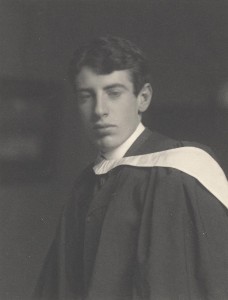 Barbour was born on August 22, 1890 in Edinburgh, Scotland to Dr. Alexander Hugh Freeland Barbour and Margaret Nelson Brown Barbour. At the age of nine, Barbour entered the Merchiston Castle School in Edinburgh. An independent, all boys boarding school noted for its academic standards and pastoral care, Barbour graduated from the school in 1906. Barbour then spent his first year of college at Marburg University in Germany before returning to Edinburgh where he earned an M.A. with Honors from Edinburgh University in 1910. In 1912, Barbour left Edinburgh for the University of Cambridge in England. It was during his tenure at Cambridge that his studies were interrupted by the outbreak of World War I. Enlisted in a Royal Field Artillery (RFA) unit, Barbour’s service was largely spent stationed in Italy with the Friends Ambulance Unit (FAU) as an ambulance driver and medical aid. However, during the war he was able to continue his academic studies and earned a B.A. in 1916 and an M.A. in 1918 from Cambridge.
Barbour was born on August 22, 1890 in Edinburgh, Scotland to Dr. Alexander Hugh Freeland Barbour and Margaret Nelson Brown Barbour. At the age of nine, Barbour entered the Merchiston Castle School in Edinburgh. An independent, all boys boarding school noted for its academic standards and pastoral care, Barbour graduated from the school in 1906. Barbour then spent his first year of college at Marburg University in Germany before returning to Edinburgh where he earned an M.A. with Honors from Edinburgh University in 1910. In 1912, Barbour left Edinburgh for the University of Cambridge in England. It was during his tenure at Cambridge that his studies were interrupted by the outbreak of World War I. Enlisted in a Royal Field Artillery (RFA) unit, Barbour’s service was largely spent stationed in Italy with the Friends Ambulance Unit (FAU) as an ambulance driver and medical aid. However, during the war he was able to continue his academic studies and earned a B.A. in 1916 and an M.A. in 1918 from Cambridge.
In 1919, Barbour left Europe for the United States to attend Columbia University in New York. The following year, on May 15, 1920, Barbour married Dorothy Dickinson in a small ocean-front ceremony at the summer home of the bride, “Kakro,” Westhampton Beach, Long Island.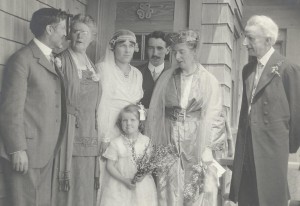
Raised in a prominent New York family, Dickinson was a graduate of Columbia University and an active spokeswoman for Christian education and the YWCA. (Within the personal letters of the George B. Barbour collection are included “VIP” letters addressed to Dorothy from such figures are Theodore Roosevelt and Abby A. (Mrs. J.D.) Rockefeller. One letter is also addressed to Dorothy’s father, Robert Dickinson, from Booker T. Washington.)
In 1920, the Barbours relocated to Peking, China upon George’s acceptance of a position as Professor of Geology at Yenching University. George and Dorothy would spend the next 11 years in China. During their time in China, George conducted research and field work on various aspects of Chinese geology and became associated with men performing the Geological Survey of China (and the discovery of the Peking Man), while Dorothy continued to promote Christian education and occasionally taught classes at the Yenching University.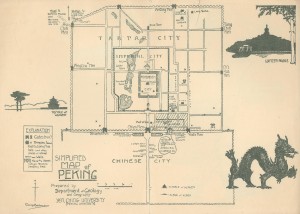 Although half a world away from Columbia University, George was able to continue his academic studies through the university and earned a Ph.D. in Geology in 1929. It was also during this period that George and Dorothy welcomed three sons (Hugh Stewart, John (Ian) Graeme, and Robert Freeland) to the family.
Although half a world away from Columbia University, George was able to continue his academic studies through the university and earned a Ph.D. in Geology in 1929. It was also during this period that George and Dorothy welcomed three sons (Hugh Stewart, John (Ian) Graeme, and Robert Freeland) to the family.
In 1931, the Barbours returned to New York as their eldest son, Hugh, had contracted “Peking Fever.” Although the family had planned to return to China as soon as the boy recovered, they were unable to obtain visas due to the political revolution in China (of which George reflects upon in his 1975 publication of “In China when…“). In 1932, George accepted a short-term teaching position at the University of Cincinnati.
Between 1933 and 1934, Barbour served as Assistant Editor for the Geological Society of America. In 1934, George obtained funding from the Rockefeller Foundation to return to China and work with the Geological Survey. However, because his family would be unable to join him in China, he instead took a teaching position at the University of London which lasted for a period of two years.
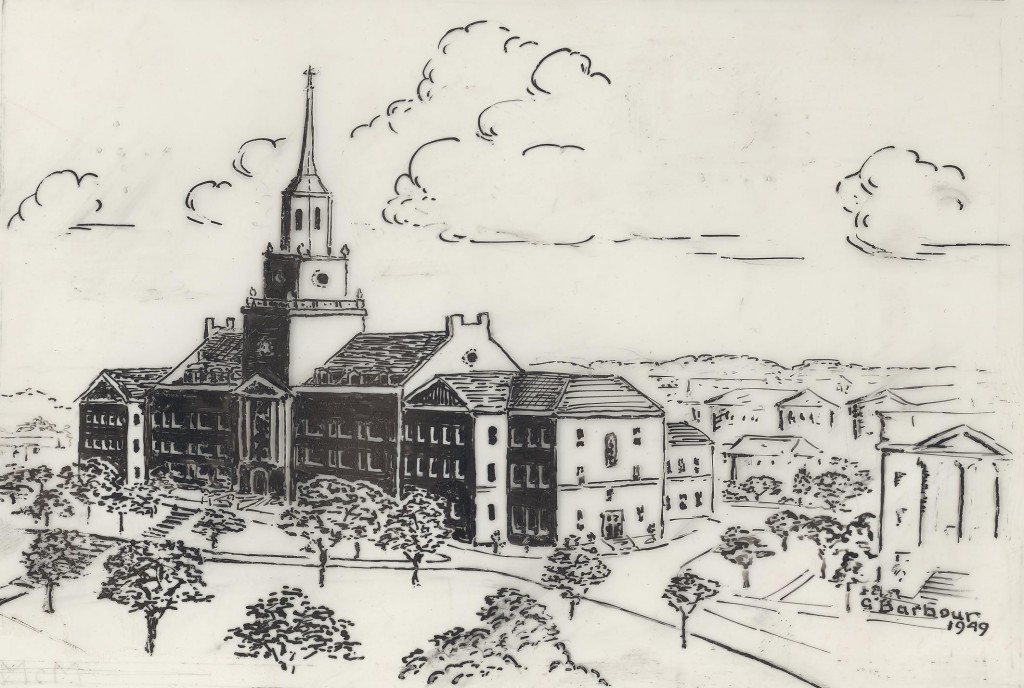 In 1937, Barbour again accepted a position at the University of Cincinnati in the capacity of professor of Geology. The following year he was appointed Dean of the College of Arts and Sciences, of which he remained until 1958. In 1958, Barbour stepped down as Dean of the College of Arts and Sciences and returned to the position of professor of Geology, and taught for an additional two years before retiring in 1960 as professor emeritus.
In 1937, Barbour again accepted a position at the University of Cincinnati in the capacity of professor of Geology. The following year he was appointed Dean of the College of Arts and Sciences, of which he remained until 1958. In 1958, Barbour stepped down as Dean of the College of Arts and Sciences and returned to the position of professor of Geology, and taught for an additional two years before retiring in 1960 as professor emeritus.
Although retired, George nonetheless remained active in his geological studies and the affairs of the University of Cincinnati. In 1968, as a gesture of appreciation, The George Barbour Award for Good Faculty-Student Relations was established by a group of his former students to honor Dr. Barbour as a scientist, scholar, teacher, and friend, and to encourage future generations of faculty to look upon teaching as a privilege and honor with an obligation to their students. First awarded at the university’s spring commencement in June 1968, this annual teaching award is presented to the University of Cincinnati professor who has contributed most to the furtherance of good student-faculty relations.
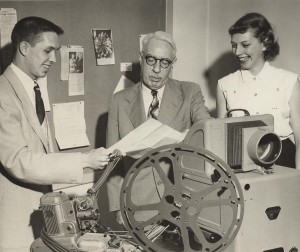 Throughout his career as a geologist, Barbour maintained professional ties with groups conducting important geological and anthropological research. He was associated with the group who discovered the remains of Peking Man, a “man” who flourished an estimated 650,000 years ago in China. Barbour also conducted a great deal of field work in South Africa with the researchers who discovered the Men-Apes of Africa. Of his correspondence with many of the major figures in the field of Geology, his closest friendship and longest maintained correspondence was with the renowned French paleontologist and geologist, Pierre Teilhard de Chardin, whom he had worked with on several field projects and wrote a book about in 1965 entitled, “In the field with Teilhard de Chardin.” For his contributions to the geological and anthropological professions, Barbour received several honors and awards. Among the numerous accolades include the Gill Memorial Award of the British Royal Geological Society (1937), Fellowships in both the Royal Society of South Africa and the Geological Society of South Africa (1949), and Fellowship of the Italian Institute of Human Paleontology in Rome (1955), one of fewer than ten Americans ever selected for this honor.
Throughout his career as a geologist, Barbour maintained professional ties with groups conducting important geological and anthropological research. He was associated with the group who discovered the remains of Peking Man, a “man” who flourished an estimated 650,000 years ago in China. Barbour also conducted a great deal of field work in South Africa with the researchers who discovered the Men-Apes of Africa. Of his correspondence with many of the major figures in the field of Geology, his closest friendship and longest maintained correspondence was with the renowned French paleontologist and geologist, Pierre Teilhard de Chardin, whom he had worked with on several field projects and wrote a book about in 1965 entitled, “In the field with Teilhard de Chardin.” For his contributions to the geological and anthropological professions, Barbour received several honors and awards. Among the numerous accolades include the Gill Memorial Award of the British Royal Geological Society (1937), Fellowships in both the Royal Society of South Africa and the Geological Society of South Africa (1949), and Fellowship of the Italian Institute of Human Paleontology in Rome (1955), one of fewer than ten Americans ever selected for this honor.
During the night of July 12, 1977, George B. Barbour passed away in his sleep. He was 86 years old.